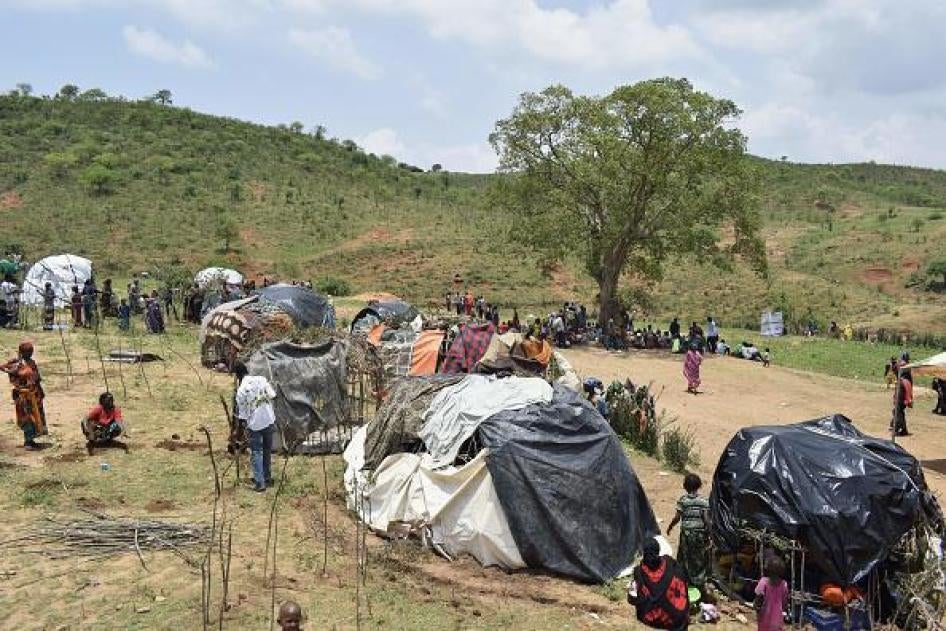Over 9,000 Ethiopians, many of them women and children, have fled into Kenya’s Marsabit County over the last ten days, escaping ongoing Ethiopian military attacks. Sadly, more Ethiopians may follow as Ethiopia continues its two-and-a-half-year descent into further instability.
On March 10 Ethiopian soldiers opened fire on a group of community members in Moyale, Ethiopia, killing at least 10 people. The defense minister announced that the killings were a “mistake.” He said that the soldiers had acted on bad intelligence, which had indicated that the civilians were members of the banned Oromo Liberation Front, an armed opposition group, a faction of which is active around the Moyale area.
Ethiopia’s security forces have targeted civilians expressing critical views of the government for harassment, arrest, and in many cases, torture for many years. Countrywide, Ethiopia’s military have killed over 1,000 civilians in response to protests since late 2015.
Kenya should pay close attention to what is happening in Ethiopia right now. In addition to the potential for further insecurity spilling across the border, the humanitarian consequences of increased conflict in Ethiopia could be devastating for both countries. Over eight million Ethiopians are in need of food aid. Many of them live in southern Ethiopia, close to the Kenyan border. If conflict in Ethiopia increases, many of its most vulnerable citizens will be looking for safety. Kinship connections, established trafficking routes, and relatively stable security all make Kenya an attractive destination.
Until late 2015, the Ethiopian government’s ruthless approach to governance – criminalizing speech critical of the government and detaining members of the opposition, the media and civic groups – suppressed growing anger, but these tactics are no longer working. Since the prime minister resigned a month ago, it remains unclear when a new one will be chosen. Ethiopia is under its second country-wide state of emergency in two years, managed by its ruthless military.
If a new prime minister is not given the room to make key political reforms, Ethiopia may well continue to descend further into disorder. Sadly, there aren’t many positive signs that a new prime minister will have such latitude.
Some of Ethiopia’s staunch Western allies, fearful of what a destabilized Ethiopia would mean for their interests, have spoken openly of their concerns and urged a change in tactics. If Ethiopia continues on its current path, neighboring states like Kenya will likely bear the impact of what could be significant migration and humanitarian crises. But, so far, the Kenyan government has been silent.
Ethiopia’s intolerance of dissent has also been exported across the border in the past. For years, Ethiopian intelligence officials, sometimes in cooperation with Kenyan police, have harassed, threatened, and on occasion kidnapped Ethiopian asylum seekers in Nairobi and elsewhere in Kenya.
Ethiopia’s military has often punished civilians in and around Moyale on both sides of the border for alleged support of Oromo Liberation Front fighters. When the group attacked military targets inside of Ethiopia in 2015, Ethiopia’s response was to unilaterally move its soldiers into Kenyan territory on no fewer than five occasions. Kenyan communities near the border told Human Rights Watch at the time that the Ethiopian military harassed and beat citizens, and eventually marched at least four Kenyan citizens to detention in Ethiopia. In the process the Ethiopian military killed three Kenyan police officers. This was all because the military believed these Kenyan communities supported the banned opposition group.
If thousands more Ethiopians move into Kenya fleeing government repression, will Ethiopia’s military continue its pattern of moving into northern Kenya in pursuit of those who oppose them, using the specter of the banned group as a justification?
Kenya can and should take the lead within the East African community in encouraging Ethiopia to embark on key domestic reforms that would prevent further abuses – including allowing political parties to operate freely and media and nongovernmental groups to operate independently. And Kenyan leaders should publicly voice their concern over the increased military aggression that causes Ethiopians to flee into Kenya. Kenya, and East Africa more broadly, need a stable and prosperous Ethiopia. Adding the voice of a trusted ally like Kenya to the many tens of millions of Ethiopians demanding change will be an important contribution toward stability in the region.









